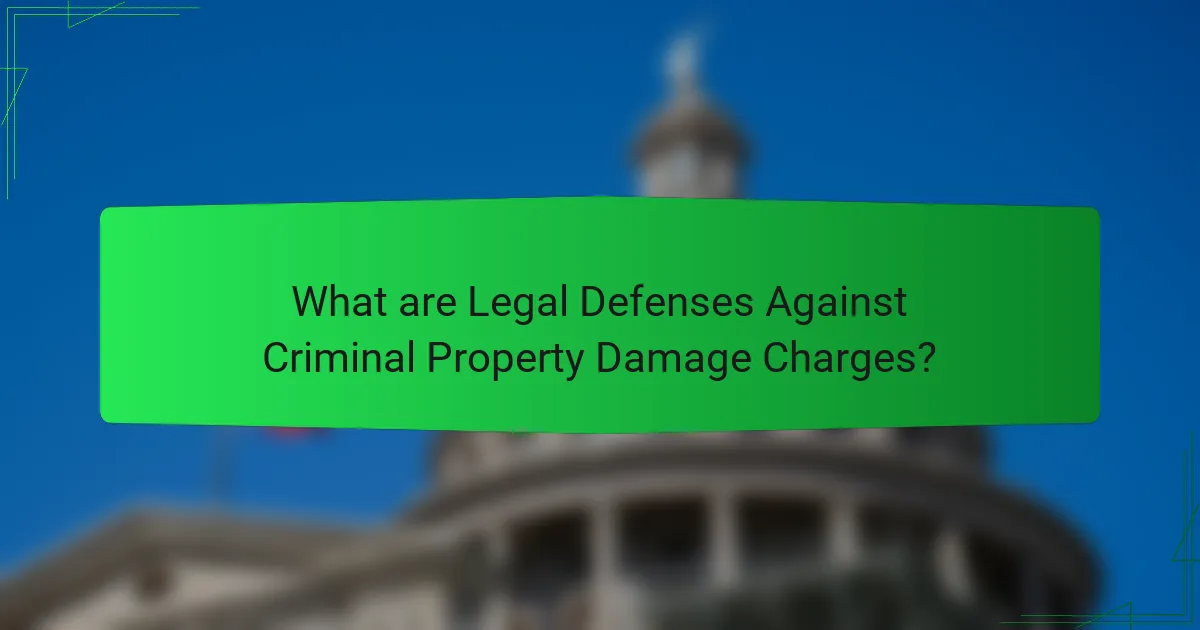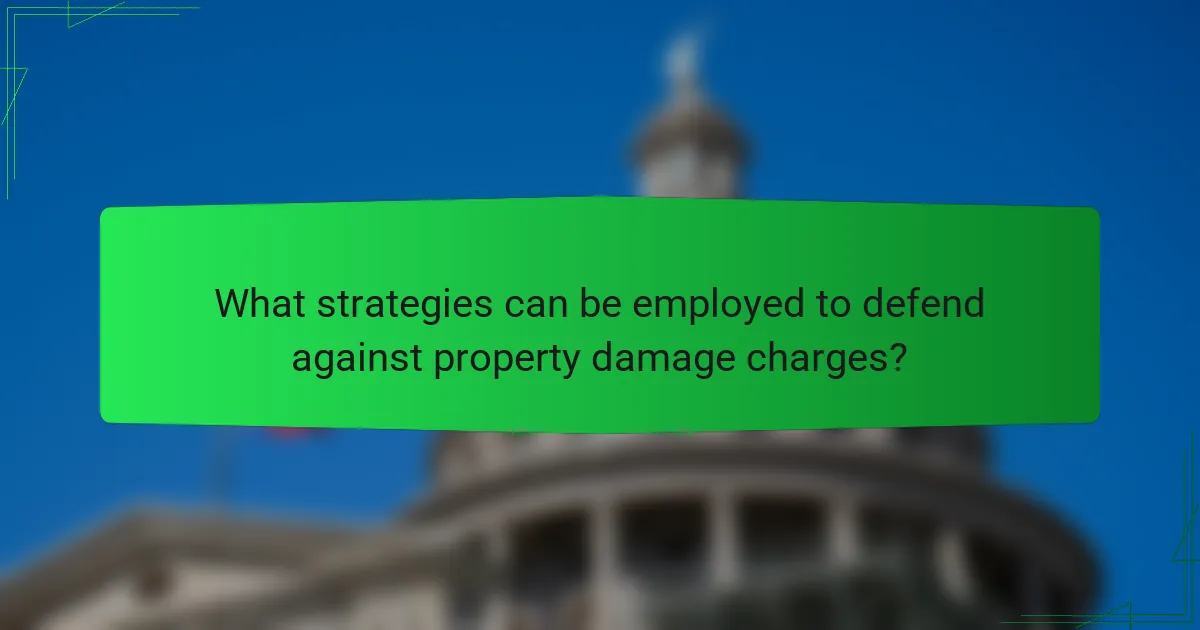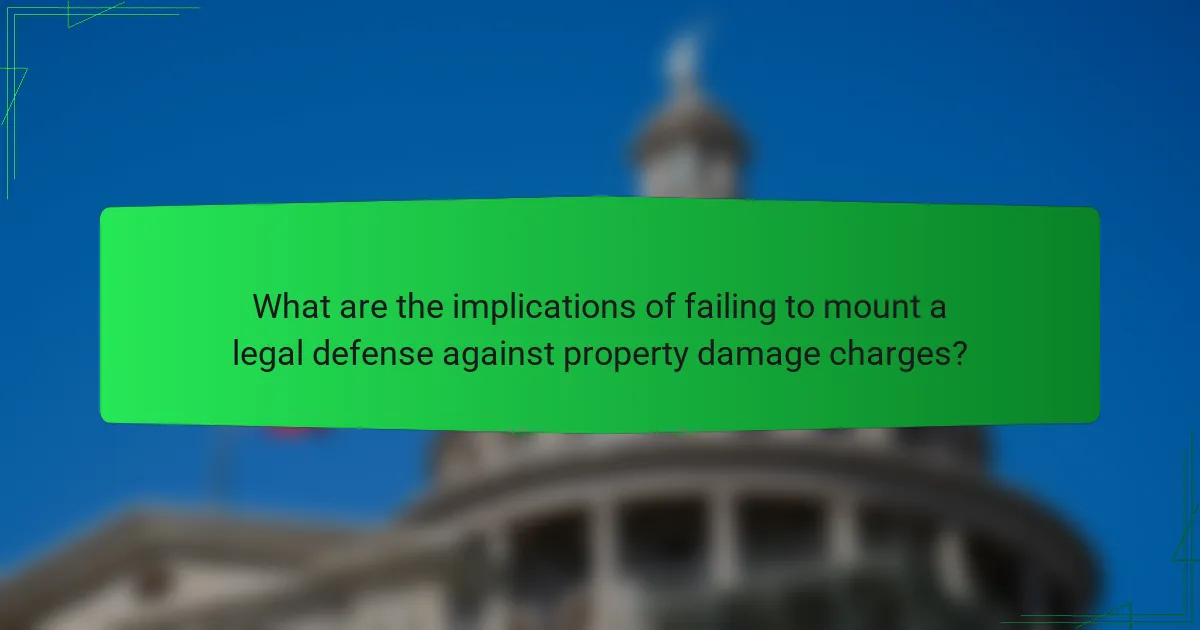Legal defenses against criminal property damage charges encompass various arguments that can help mitigate or negate liability. Key defenses include lack of intent, where the accused did not aim to cause damage; consent from the property owner; self-defense during an incident; necessity to prevent greater harm; and alibi demonstrating non-presence at the time of the damage. Effective strategies to defend against such charges involve proving lack of intent, establishing pre-existing damage, demonstrating consent, presenting mitigating circumstances, and utilizing expert testimony. Failing to present a legal defense can result in automatic liability, financial penalties, and a potential criminal record, significantly impacting an individual’s future opportunities.

What are Legal Defenses Against Criminal Property Damage Charges?
Legal defenses against criminal property damage charges include several key arguments. One common defense is lack of intent. If the accused did not intend to cause damage, this can negate culpability. Another defense is consent. If the property owner consented to the actions that led to damage, charges may not hold. Self-defense can also apply. If damage occurred while protecting oneself or others, this may be a valid defense. Additionally, necessity can be argued. If damaging property was necessary to prevent greater harm, this may be justifiable. Alibi can serve as a defense too. If the accused can prove they were not present at the time of the incident, charges may be dismissed. Each of these defenses requires specific evidence to support the claims made.
How do these legal defenses operate in practice?
Legal defenses against criminal property damage charges operate by presenting arguments that challenge the prosecution’s case. Common defenses include asserting a lack of intent to cause damage. Defendants may claim that the damage was accidental or resulted from a legitimate action. Another strategy is to argue that the property damage was justified under certain circumstances, such as self-defense or necessity.
In practice, these defenses require evidence to support claims. For instance, a defendant may provide witness testimony or physical evidence that corroborates their account. Legal precedents also play a crucial role in shaping these defenses, as courts rely on previous rulings to inform their judgments.
Successful legal defenses can lead to reduced charges or complete acquittal. The effectiveness of these defenses often depends on the specific facts of the case and the quality of the legal representation.
What are the foundational principles behind these defenses?
The foundational principles behind defenses against criminal property damage charges include necessity, consent, and self-defense. Necessity justifies actions taken to prevent greater harm. For example, damaging property to save a life can be defended under this principle. Consent involves obtaining permission from the property owner before causing damage. This can negate liability if the owner agrees to the action. Self-defense applies when property damage occurs to protect oneself or others from imminent harm. Each principle is rooted in legal precedents that emphasize the context of actions taken. These principles aim to balance individual rights with societal laws.
How do different jurisdictions interpret these defenses?
Different jurisdictions interpret legal defenses against criminal property damage charges in varied ways. For instance, some jurisdictions allow the defense of consent, meaning if the property owner permitted the action, it may not be deemed criminal. Other jurisdictions may emphasize the necessity defense, where damaging property is justified to prevent greater harm. Additionally, the interpretation of self-defense can vary; some regions may accept property damage as a defensive measure against an imminent threat. Case law also influences these interpretations, as precedents set by higher courts guide lower courts in similar cases. Overall, the application of these defenses is contingent on local statutes and judicial interpretations.
What are common arguments used in legal defenses for property damage?
Common arguments used in legal defenses for property damage include consent, necessity, and self-defense. Consent argues that the property owner agreed to the actions that caused damage. Necessity claims that the damage was required to prevent greater harm. Self-defense asserts that the actions taken were to protect oneself or others from immediate danger. Additionally, the argument of accident can be made, indicating that the damage was unintentional. These defenses are often supported by evidence such as witness statements or expert testimony. Each argument aims to demonstrate that the defendant’s actions were justified under specific circumstances.
How does self-defense apply in property damage cases?
Self-defense can apply in property damage cases when an individual believes their property is under imminent threat. The individual must demonstrate that their actions were necessary to prevent harm to their property. The use of force must be proportional to the threat faced. For example, if someone is attempting to damage a car, the owner may take action to stop the damage. Legal standards vary by jurisdiction, but generally, self-defense in property cases is recognized to protect against unlawful intrusion or damage. Courts often assess whether the response was reasonable and necessary. This principle is rooted in the idea of protecting one’s own property rights.
What role does consent play in legal defenses against property damage?
Consent can serve as a legal defense against property damage claims. When a property owner grants permission for certain actions, it may negate liability for damages incurred. For instance, if a person allows another to use their property, any resulting damage may not constitute a legal violation. This principle is rooted in the idea that consent implies acceptance of potential risks. Courts often examine the clarity and scope of consent given. A lack of clear consent can lead to liability for damages. Therefore, understanding the nuances of consent is crucial in property damage cases.
How can necessity be used as a defense in these cases?
Necessity can be used as a defense in criminal property damage cases when the defendant acted to prevent greater harm. This legal principle argues that the action taken was necessary to avoid an imminent threat. For example, if a person damages property to escape a dangerous situation, necessity may apply. Courts require proof that the harm avoided was greater than the damage caused. The necessity defense is often scrutinized for its justification and proportionality. Historical cases demonstrate its application, such as in situations involving natural disasters or life-threatening emergencies. The defendant must show that no reasonable alternative existed to prevent the harm.

What strategies can be employed to defend against property damage charges?
To defend against property damage charges, one can employ several strategies. First, proving lack of intent is crucial. If the damage was accidental, this can negate liability. Second, establishing that the property was already damaged can be effective. Documenting pre-existing conditions may support this claim. Third, demonstrating consent from the property owner can also serve as a defense. If permission was granted for actions that led to damage, liability may be reduced. Fourth, presenting evidence of mitigating circumstances can help. For instance, if an unforeseen event caused the damage, this may lessen culpability. Lastly, utilizing expert testimony can strengthen a defense. Experts can provide insights on the nature of the damage and causation. These strategies are commonly recognized in legal contexts and can be effective in court.
How can evidence be effectively utilized in these defenses?
Evidence can be effectively utilized in defenses against criminal property damage charges by establishing facts that support the defendant’s claims. First, presenting physical evidence, such as photographs or videos, can demonstrate the actual condition of the property. This evidence can counter claims of damage or show that the damage occurred before the defendant’s involvement.
Second, witness testimonies can provide corroborative accounts that support the defendant’s narrative. Eyewitnesses can testify to the circumstances surrounding the alleged damage. This can create reasonable doubt regarding the defendant’s responsibility.
Third, expert testimony can clarify technical aspects of the case, such as the cause of the damage. Experts can analyze the evidence and provide opinions that may exonerate the defendant.
Additionally, documentation, such as maintenance records or repair invoices, can be used to show that the property was well-maintained prior to the incident. This can undermine claims of negligence or intentional damage.
Overall, the strategic use of evidence can significantly strengthen a defense by creating doubt and supporting the defendant’s position.
What types of evidence are most persuasive in property damage cases?
Photographic evidence is the most persuasive type in property damage cases. Clear images of the damage can establish the extent and nature of the harm. Expert testimony can also be compelling, as professionals can provide insights into the cause and impact of the damage. Documentation such as repair estimates and invoices supports claims of financial loss. Witness statements can corroborate events surrounding the damage, adding credibility. Additionally, surveillance footage can serve as direct evidence of the incident. All these forms of evidence collectively strengthen a case by providing concrete details and supporting claims.
How can expert testimony enhance a defense strategy?
Expert testimony can significantly enhance a defense strategy by providing specialized knowledge that supports the defense’s claims. This testimony can clarify complex issues that laypersons may not understand. For instance, an expert can explain the technical aspects of property damage, such as the methods of repair or the costs involved. Their insights can help establish reasonable doubt regarding the defendant’s intent or actions. Additionally, expert testimony can counter opposing claims by providing evidence that contradicts the prosecution’s narrative. Studies show that juries often place considerable weight on expert opinions, which can sway their perceptions. Overall, expert testimony serves as a crucial tool in building a credible and persuasive defense.
What are the potential outcomes of employing these defenses?
Employing legal defenses against criminal property damage charges can lead to various outcomes. Successful defenses may result in the dismissal of charges. This can occur if evidence shows lack of intent or consent from the property owner. Alternatively, a defendant may receive a not guilty verdict if the evidence is insufficient. Plea bargains may also be negotiated, leading to reduced charges or penalties. In some cases, defenses can mitigate sentencing if a conviction occurs. For instance, demonstrating provocation may lead to lesser consequences. Overall, the effectiveness of these defenses significantly impacts legal outcomes for defendants.
What factors influence the success of a legal defense in property damage cases?
The success of a legal defense in property damage cases is influenced by several key factors. The quality of evidence presented plays a crucial role. Strong, clear evidence can substantiate the defense’s claims. Witness credibility also significantly impacts the case outcome. Reliable witnesses can bolster the defense’s position. The legal strategy employed is another critical factor. An effective strategy tailored to the specifics of the case can enhance the defense’s chances. Jurisdictional laws and precedents affect the case as well. Different jurisdictions may have varying standards for proving property damage. Lastly, the defendant’s history and character can influence the court’s perception. A positive history may lead to more favorable outcomes.
How do plea bargains factor into these legal strategies?
Plea bargains are agreements in which a defendant pleads guilty to a lesser charge. These agreements can significantly influence legal strategies in cases of criminal property damage. By accepting a plea bargain, defendants may receive reduced sentences or lesser charges, which can mitigate the consequences of a conviction.
This strategy allows defendants to avoid the uncertainty of a trial. Trials can be lengthy and expensive, and the outcome is unpredictable. Plea bargains also help alleviate court congestion by resolving cases more quickly. According to the Bureau of Justice Statistics, approximately 90% of criminal cases are resolved through plea agreements.
In property damage cases, defendants may negotiate terms that reflect their willingness to compensate victims or take responsibility. This can lead to more favorable outcomes, such as probation instead of incarceration. Overall, plea bargains serve as a practical tool in legal strategies, balancing the interests of the defendant and the judicial system.

What are the implications of failing to mount a legal defense against property damage charges?
Failing to mount a legal defense against property damage charges can lead to severe consequences. The individual may face automatic liability for the damages claimed. This could result in a judgment against them, requiring financial compensation to the affected party. Without a defense, the court may impose penalties or fines as part of the ruling. Additionally, a criminal record could be established, impacting future employment opportunities. The absence of a defense limits the chance to contest evidence or present mitigating factors. This situation can cause long-term financial strain due to potential restitution payments. Overall, failing to defend oneself can severely limit options and increase legal repercussions.
What are the potential legal consequences of a conviction?
A conviction can lead to various legal consequences. These consequences may include imprisonment, fines, or probation. Imprisonment can vary in length depending on the severity of the crime. Fines may also be substantial, often reflecting the nature of the offense. Probation allows individuals to remain in the community under specific conditions. Additionally, a conviction can result in a criminal record. This record can impact future employment and housing opportunities. In some cases, individuals may lose certain civil rights, such as the right to vote or possess firearms. These consequences underscore the serious implications of a criminal conviction.
How can a conviction affect future legal proceedings?
A conviction can significantly impact future legal proceedings. It may result in a criminal record, which can influence sentencing in subsequent cases. Courts often consider past convictions when determining the severity of penalties. This can lead to harsher sentences for repeat offenders. Additionally, a conviction may affect plea negotiations in future cases. Prosecutors might be less inclined to offer favorable deals to individuals with prior convictions. Furthermore, it can limit the availability of certain legal defenses. For example, a history of similar offenses may weaken arguments for leniency. Overall, a conviction shapes the legal landscape for future proceedings.
What best practices should be followed when preparing a defense against property damage charges?
Gather all relevant evidence to support your defense against property damage charges. This includes photographs of the property, witness statements, and any documentation related to the incident.
Consult with an experienced attorney who specializes in property damage cases. An attorney can provide legal guidance and help develop a strong defense strategy.
Review local laws regarding property damage. Understanding the legal definitions and potential defenses can inform your approach.
Prepare a clear narrative of events leading to the charges. This should include your perspective and any mitigating circumstances.
Collect records of any communications related to the incident. This may include emails, texts, or letters that could support your case.
Consider engaging expert witnesses if necessary. Their testimony can provide credibility and support your defense.
Practice your defense presentation. Being articulate and confident can positively influence the outcome.
Stay organized and keep all materials in a secure place. This helps ensure that you have everything readily available for your attorney and court appearances.
How can individuals ensure they gather the right evidence?
Individuals can ensure they gather the right evidence by following a systematic approach. First, they should identify the type of evidence needed for their case. This can include photographs, videos, witness statements, or documents. Next, they must collect evidence promptly to avoid loss or degradation. For instance, taking photos of the scene immediately after an incident is crucial.
Additionally, individuals should ensure that the evidence is relevant and admissible in court. This means understanding the legal standards for evidence in their jurisdiction. They can consult legal resources or professionals for guidance.
Lastly, maintaining a clear chain of custody for the evidence is essential. This involves documenting who collected the evidence and how it was stored. Proper documentation strengthens the credibility of the evidence during legal proceedings.
What steps should be taken when consulting with a legal professional?
Gather all relevant documents and information before the consultation. This includes contracts, photographs, and correspondence related to the case. Clearly outline the issues you need assistance with. Be prepared to explain your situation concisely and accurately. Write down specific questions you want to ask the legal professional. This ensures you cover all necessary points during the meeting. Take notes during the consultation for future reference. Discuss fees and payment structures upfront to avoid misunderstandings. Follow up with any additional information the legal professional may need after the meeting.
Legal defenses against criminal property damage charges encompass various arguments that can challenge the prosecution’s case. Key defenses include lack of intent, consent from the property owner, self-defense, and necessity, each requiring specific evidence to substantiate claims. The article explores how these defenses operate in practice, the foundational principles behind them, and their interpretation across different jurisdictions. Additionally, it discusses common arguments, the role of evidence, and potential outcomes when employing these defenses, providing a comprehensive overview of strategies to mitigate legal repercussions related to property damage charges.